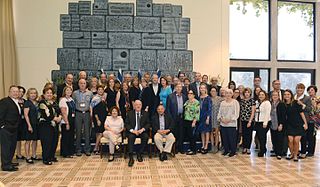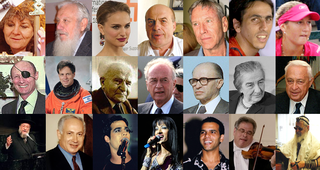The National Jewish Population Survey (NJPS), most recently performed in 2000-01, is a representative survey of the Jewish population in the United States sponsored by United Jewish Communities and the Jewish Federation system. [1]
Based on the results of the 2000-01 survey, the total Jewish population in the United States was estimated at 5.2 million, comprising 4.1 million adults and 1 million children. An additional 100,000 Jews in institutional settings were not sampled as part of NJPS but are included in the total. This total represents a decline from the 1990 NJPS, which estimated a total Jewish population of 5.5 million people. Jews who have married since 1996 have an intermarriage rate of 47%. [1]
There is disagreement about how to define who is Jewish. As part of the 2000 NJPS, a Jew was defined as a person:
- Whose religion is Jewish, or
- Whose religion is Jewish and something else, or
- Who has no religion and has at least one Jewish parent or a Jewish upbringing, or
- Who has a non-monotheistic religion, and has at least one Jewish parent or a Jewish upbringing.
There were no survey performed in 2010 due to the lack of funding. The 2000-01 NJPS – which by some estimates cost nearly $6 million, far more than budgeted – was widely criticized, both for its findings and for its methodology. United Jewish Communities, the survey’s sponsor, announced afterward that it would not sponsor future national population surveys. [2]

The State of Israel has a population of approximately 9,408,100 inhabitants as of September 2021. Some 74.24% are Jews of all backgrounds, 20.95% are Arab of any religion other than Jewish, while the remaining 4.81% are defined as "others", including persons of Jewish ancestry deemed non-Jewish by religious law and persons of non-Jewish ancestry who are family members of Jewish immigrants, Christian non-Arabs, Muslim non-Arabs and all other residents who have neither an ethnic nor religious classification.

Haredi Judaism consists of groups within Orthodox Judaism which are characterized by their strict adherence to halakha and traditions, in opposition to modern values and practices. Its members are usually referred to as ultra-Orthodox in English; however, the term "ultra-Orthodox" is considered pejorative by many of its adherents, who prefer terms like strictly Orthodox or Haredi. Haredi Jews regard themselves as the most religiously authentic group of Jews, although other streams of Judaism disagree.
Religion in the United States is diverse, with Christianity and specifically Protestantism being the majority religion, although declining at rapid pace. Various religious faiths have flourished within the United States. Just over 40% of Americans report that religion plays a very important role in their lives, a proportion unique among developed countries. Freedom of religion in the United States is guaranteed in the First Amendment to the United States Constitution.

Argentina, for much of its history and including the present day, has been an overwhelmingly Christian country. The largest Christian denomination in the country is Roman Catholicism. The historical background is very much due to the Spanish influence brought about through the newly conquered territories. However, immigration throughout the 20th century has brought other Catholics and denominations from various regions to Argentina.

American Jews or Jewish Americans are American citizens who are Jewish, whether by religion, ethnicity, culture, or nationality. Today the Jewish community in the United States consists primarily of Ashkenazi Jews, who descend from diaspora Jewish populations of Central and Eastern Europe and comprise about 90–95% of the American Jewish population.
As of 2021, the world's "core" Jewish population was estimated at 15.2 million, or 0.19% of the 7.89 billion worldwide population. This number rose to 17.9 million with the addition of the "connected" Jewish population, including those who say they are partly Jewish or that have Jewish backgrounds from at least one Jewish parent, and rose again to 20.9 million with the addition of the "enlarged" Jewish population, including those who say they have Jewish backgrounds but no Jewish parents and all non-Jewish household members who live with Jews. Counting all those who are eligible for Israeli citizenship under Israel's Law of Return, in addition to Israeli Jews, raised the total to 23.7 million.
Jewish population centers have shifted tremendously over time, due to the constant streams of Jewish refugees created by expulsions, persecution, and officially sanctioned killing of Jews in various places at various times. In addition, assimilation and forced conversions have also impacted Jewish population sizes throughout Jewish history.

Jewish identity is the objective or subjective state of perceiving oneself as a Jew and as relating to being Jewish. Under a broader definition, Jewish identity does not depend on whether a person is regarded as a Jew by others, or by an external set of religious, or legal, or sociological norms. Jewish identity does not need to imply religious orthodoxy. Accordingly, Jewish identity can be cultural in nature. Jewish identity can involve ties to the Jewish community. Orthodox Judaism bases Jewishness on matrilineal descent. According to Jewish law (halacha), all those born of a Jewish mother are considered Jewish, regardless of personal beliefs or level of observance of Jewish law. Progressive Judaism and Haymanot Judaism in general base Jewishness on having at least one Jewish parent, while Karaite Judaism bases Jewishness only on paternal lineage. This differences between the major Jewish movements was the reason of Who is a Jew? debate and topic.
Yerida is emigration by Israeli Jews from the State of Israel. Yerida is the opposite of aliyah, which is immigration to Israel. Zionists are generally critical of the act of yerida and the term is somewhat derogatory. The emigration of non-Jewish Israelis is not included in the term "Yerida".

The Jewish Federations of North America (JFNA), formerly the United Jewish Communities (UJC), is an American Jewish umbrella organization representing 146 Jewish Federations and 300 independent Jewish communities across North America, which raise and distribute more than $3 billion annually and through planned giving and endowment programs to support social welfare, social services and educational needs. JFNA also provides fundraising, organization assistance, training, and overall leadership to the Jewish Federations and communities throughout the United States and Canada. The Federation movement protects and enhances the well-being of Jews worldwide through the values of tikkun olam, tzedakah and Torah.

Religion in Egypt controls many aspects of social life and is endorsed by law. The state religion of Egypt is Islam. Although estimates vary greatly in the absence of official statistics. Since the 2006 census religion has been excluded, and thus available statistics are estimates made by religious and non-governmental agencies. The country is majority Sunni Muslim, with the next largest religious group being Coptic Orthodox Christians. The exact numbers are subject to controversy, with Christians alleging that they have been systemically under-counted in existing censuses.
Growth of religion involves the spread of individual religions and the increase in the numbers of religious adherents around the world. Statistics commonly measure the absolute number of adherents, the percentage of the absolute growth per-year, and the growth of converts in the world.

Interfaith marriage in Judaism was historically looked upon with very strong disfavor by Jewish leaders, and it remains a controversial issue among them today. In the Talmud and all of resulting Jewish law until the advent of new Jewish movements following the Jewish Enlightenment, the "Haskala", marriage between a Jew and a gentile is both prohibited, and also void under Jewish law.

Israeli Jews or Jewish Israelis are Israeli citizens and nationals who are Jewish through either their Jewish ethnicity and/or their adherence to Judaism. The term also includes the descendants of Jewish Israelis who have emigrated and settled outside of the State of Israel. Alongside Samaritans and populations from the Jewish diaspora scattered outside of the Land of Israel, Jewish Israelis comprise the modern descendants of the ancient Israelites and Hebrews. They are predominantly found in Israel and the Western world, as well as in other countries worldwide in smaller numbers. The overwhelming majority of Israeli Jews speak Hebrew, a Semitic language, as their native tongue. Israel, the Jewish state, is the only country that has a Jewish-majority population, and is currently home to approximately half of the world's Jews.
In Judaism, a person who is shomer Shabbat or shomer Shabbos is a person who observes the mitzvot (commandments) associated with Judaism's Shabbat, or Sabbath, which begins at dusk on Friday and ends after sunset on Saturday.

Israeli Americans are Americans who have Israeli citizenship either by descent or Aliyah, or are Americans of Israeli national origin. Reflecting Israel's population, while the vast majority are Jewish, they also include the faiths of the Arab-Israeli minorities: Christians, Druze, and Muslims; as well as other Jewish and non-Jewish ethnic groups of Israel.

Jews or Jewish people are an ethnoreligious group and nation originating from the Israelites and Hebrews of historical Israel and Judah. Jewish ethnicity, nationhood, and religion are strongly interrelated, as Judaism is the ethnic religion of the Jewish people, although its observance varies from strict to none.
Proactive conversion is a term used to refer to measures by various promoters of Judaism to provide outreach to non-Jews. It is distinguished from proselytizing, or active attempts of persuasion and solicitation toward conversion, but it is distinguished from the traditional rabbinical policies regarding prospective proselytes in that programs for conversion are opened to first-time inquirees.

Exodus of Iran's Jews refers to the emigration of Persian Jews from Iran in the 1950s and the later migration wave from the country during and after the Iranian Revolution of 1979, during which the community of 80,000 dropped to less than 20,000. The migration of Persian Jews after the Iranian Revolution is mostly attributed to fear of religious persecution, economic hardships and insecurity after the deposition of the Imperial regime, consequent domestic violence and the Iran–Iraq War.
Gary Tobin was a demographer and researcher on the Jewish community. Tobin's work focused on Jewish demographics, racial make-up, and philanthropy.











